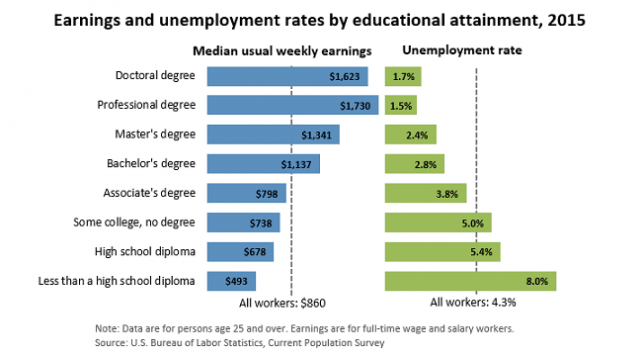7 Jobs You’ll Never Get Without a Master’s Degree

More employers are looking to hire people with master’s degrees. | Imeh Akpanudosen/Getty Images for UCLA
A master’s degree is the new bachelor’s degree, at least according to many employers. More than one-quarter of companies are looking to hire people with graduate degrees for positions where a four-year degree was once sufficient, a recent CareerBuilder survey found
Not only can earning a graduate degree give you a leg up in the job market, but it can also be key to unlocking higher lifetime earnings. In 2013, people who had a bachelor’s degree earned a median salary of $56,000 a year, while those whose highest level of education was a master’s degree earned $68,000 annually, according to the Bureau of Labor Statistics (BLS). People with master’s degrees are also slightly less likely to be unemployed than those with just a bachelor’s degree.

earnings and unemployment rates | Source: Bureau of Labor Statistics
Numbers like those have sent many people scurrying to send off applications to business school and other graduate degree programs, in the hopes that spending just a little more time in school will further their career goals. But for some, earning a master’s degree isn’t optional. In a handful of fields, education beyond the undergraduate level is a strict job requirement. And we’re not just talking about doctors and lawyers, who must earn professional degrees before they can get a job. People who hope to become librarians, family therapists, and physician’s assistants must also earn advanced degrees if they hope to secure an employment offer.
Here are seven jobs you won’t be able to get if you don’t have a master’s degree.
Median salary data courtesy of the BLS.
1. Librarian

To become a librarian, you’ll need a master’s degree in library science. | Source: iStock
Median salary: $56,170
If you want to be a librarian, a master’s degree in library science or a related subject, like information science, is required. For the best chances of finding a job, you’ll need to attend one of the roughly 60 programs accredited by the American Library Association. Many librarians work in public libraries or as school or academic librarians, but jobs are also available in corporate, theological, medical and other specialized libraries.
2. Marriage and family therapist
Median salary: $42,250
Marriage and family therapists address mental and emotional health issues between couples and within families. To become a family or marriage therapist, you typically need a master’s degree in psychology, clinical mental health counseling, marriage and family therapy, or a related field.
3. Speech-language pathologist
Median salary: $71,550
Speech-language pathologists (also known as speech therapists) diagnose and treat communication and swallowing disorders. Many work in schools; others get jobs in hospitals or other healthcare settings. If you’re interested in becoming a speech-language pathologist, you’ll need to attend a program accredited by the American Speech-Language Hearing Association.
4. Epidemiologists
Median salary: $67,420
Epidemiologists study outbreaks of disease in human populations. They’re on the front lines of identifying the causes and preventing the spread of illnesses like the Zika virus and ebola, as well as spotting the signs of brewing public health crises, like the lead-tainted water in Flint, Michigan. To pursue this career, you’ll need a master’s degree in public health with a focus on epidemiology, though some people pursue more advanced training.
5. Physician’s assistant

Physician’s assistants diagnose and treat patients. | Source: iStock
Median salary: $95,820
Physician’s assistants practices under the supervision of a doctor and can diagnose and treat patients, write prescriptions, and even perform minor surgery. You’ll need to complete a accredited master’s degree program tobecome a physician’s assistant.
6. Archivist
Median salary: $46,300 (all archivists, curators, and museum workers)
Archivists select, organize, and preserve archival material. They might work for a museum, university, historical society, or the government. Most archivists will have earned a degree in library science, though some might have earned a master’s in history or museum studies. A few universities offer graduate-level degrees specifically in archival science.
7. Economist
Median salary: $95,710
Economists analyze economic data and monitor economic trends and issues. While some entry-level positions are available to people with just a bachelor’s degree, you’ll need a master’s degree (and possibly a Ph.D.) if you hope to advance in your career. Economists often work for the government or other large institutions, like the World Bank or the International Monetary Fund.
No comments:
Post a Comment